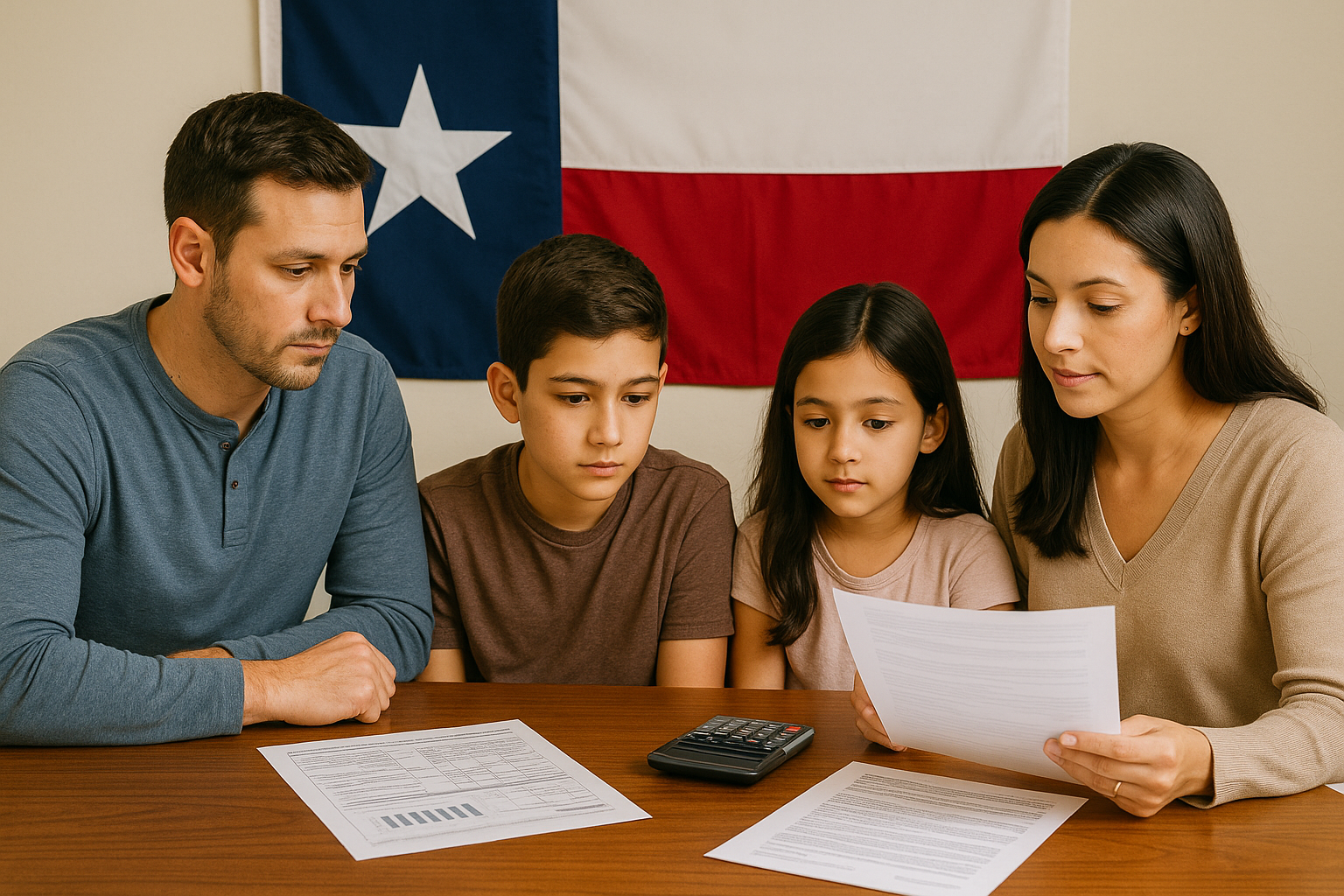Complete Guide to Autism Resources in Arlington, TX

For families in North Texas, the journey to finding the right support network can feel overwhelming. The sheer volume of information online often creates more questions than answers, leaving parents unsure of where to begin. This is where a clear, consolidated guide becomes invaluable. We’ve done the legwork to compile a list of the most effective and trusted autism resources Arlington Texas provides, covering everything from evidence-based therapies and educational support to community groups that offer a sense of belonging. Think of this as your roadmap to building a comprehensive support system for your child, one that empowers them to thrive at home, in school, and in the community.
Key Takeaways
- Build a team around your child: A strong support system often involves more than one type of therapy. Look into combining ABA with specialized services like speech and occupational therapy, and collaborate with your child’s school to ensure everyone is working toward the same goals.
- Find your starting point and community: You don't have to figure this out alone. Begin by calling 2-1-1 or exploring the Texas Children's Autism Program for official guidance, then connect with local parent support groups and sensory-friendly programs to build your personal network.
- Address the financial side head-on: Get clear on costs early by calling your insurance provider to confirm benefits. Look into Texas Medicaid for coverage of necessary therapies and apply for local grants through organizations like the Autism Society of Texas to help with out-of-pocket expenses.
Finding Autism Services in Arlington
What Therapies Are Available?
When you start looking for autism services in Arlington, you’ll find that many centers focus on providing Applied Behavior Analysis (ABA) therapy. This is a widely recognized, evidence-based approach designed to help children improve their social, communication, and learning skills. What I appreciate most about ABA is that it’s not a one-size-fits-all method. Instead, therapists use positive reinforcement to create a treatment plan that is completely tailored to your child’s specific needs and strengths. This personalized strategy is key to helping children make real, lasting progress.
Find Programs for Every Age
Finding the right program often means finding one that fits your child’s specific age and developmental stage. A great statewide resource is the Children's Autism Program, which is dedicated to supporting families across Texas. Locally, many centers serve specific age groups. For example, Action Behavior Center works with children from 18 months up to 13 years old, offering different programs that adapt as kids grow and their needs change. This ensures that whether you have a toddler just starting their journey or an older child needing continued support, you can find a program built for them.
How to Handle Insurance Coverage
Navigating insurance can feel like a full-time job, but you have options in Arlington. Coverage varies significantly between providers, so it’s always a good idea to call and ask directly. For instance, the Arlington Autism Center accepts several private insurance plans like Blue Cross Blue Shield and Aetna but does not take Medicaid. On the other hand, a provider like Action Behavior Center is in-network with over 120 different insurance plans, which can make services much more accessible. Doing a little research upfront can save you a lot of headaches later.
Your Step-by-Step Enrollment Guide
So, what’s the first step? A fantastic starting point for any family in Texas is to call 2-1-1 or visit the 211 Texas website. This service can connect you with local contractors and guide you to the right resources in the Arlington area. Once you have a shortlist of potential centers, I always encourage parents to schedule a tour. There is no substitute for seeing the environment for yourself, meeting the staff, and asking questions in person. It’s the best way to get a true feel for a place and decide if it’s the right community for your child and family.
Top Autism Service Providers in Arlington
Finding the right support for a child with autism is a deeply personal journey, and Arlington offers a diverse landscape of providers to meet those unique needs. For families and the BCBAs guiding them, the number of options can be both a blessing and a challenge. The key is understanding what to look for. Some families prefer comprehensive centers where multiple therapies like ABA, speech, and occupational therapy are available under one roof. This approach can simplify scheduling and foster collaboration between therapists. Others might find that a specialized clinic, focusing solely on one area like communication or motor skills, provides the targeted attention their child needs.
As a BCBA, your role in helping families make these decisions is invaluable. You’re not just a clinician; you’re a guide who helps connect families with the resources that best fit their goals and lifestyle. This often involves researching local centers, understanding their methodologies, and explaining the options in a clear, supportive way. While you’re focused on providing that guidance, tools can work in the background to streamline your practice. Platforms like Alpaca Health are designed to help you automate administrative tasks like note-taking and treatment plan generation, freeing you up to dedicate more time to client care and family collaboration. To help you build your resource list for local families, here are some of the leading autism service providers in Arlington.
Comprehensive Treatment Centers
For families looking for a one-stop shop, these comprehensive centers offer a range of services with a strong focus on evidence-based practices. The Arlington Autism Center and Action Behavior Centers are well-known for their ABA therapy programs, using play and positive reinforcement to help children build crucial skills. Similarly, providers like Blue Sprig Autism and Autism Spectrum Therapies create personalized ABA plans to improve communication and daily living abilities. For an even broader range of support, Hopebridge Autism Therapy integrates ABA with occupational and speech therapy, offering a multidisciplinary approach to care that addresses multiple developmental areas at once.
Specialized Therapy Providers
Sometimes, a child’s needs call for a more focused approach. Arlington has excellent specialized providers who are experts in their respective fields, offering targeted support to help children thrive. For instance, ABC Pediatric Therapy provides a suite of services including speech, occupational, and physical therapy to support children with various developmental delays. If communication is the primary goal, the specialists at Speech & Language Centers focus specifically on speech therapy for children, including those on the autism spectrum. Meanwhile, Occupational Therapy Clinics concentrate on helping children develop the essential motor and life skills needed for success at home and in school.
Key Therapy Programs to Consider
Finding the right mix of therapies is a crucial step in creating a supportive plan for a child with autism. Arlington offers a variety of programs, each designed to target specific skills and developmental areas. A comprehensive approach often combines several of these evidence-based therapies to help children thrive at home, in school, and in the community. As a BCBA, understanding these options helps you guide families toward a well-rounded and effective treatment plan that addresses the whole child. This knowledge allows you to collaborate more effectively with other providers and ensure your ABA services complement the work being done in speech, occupational therapy, and other settings. By building a network of care, you can help create a seamless support system for your clients and their families, leading to more consistent progress and better long-term outcomes.
Applied Behavior Analysis (ABA)
Applied Behavior Analysis (ABA) is a cornerstone of autism treatment. It’s a widely recognized and evidence-based treatment that focuses on improving specific behaviors, from social skills to communication, through positive reinforcement. Families often see significant improvements in their child's ability to learn new skills and follow directions. For practitioners, managing the detailed data collection and reporting for ABA can be demanding. Using an AI-powered tool like Alpaca Health can help you automate session notes and treatment plan development, freeing you up to focus on what truly matters: your clients and the quality of care you provide.
Speech and Language Therapy
Clear communication is a key goal for many families, and speech and language therapy provides targeted support. This therapy helps children improve both verbal and non-verbal communication, understand language, and express their own thoughts and needs more effectively. While ABA therapy is known to be very effective in building foundational communication skills, a dedicated speech-language pathologist (SLP) can address specific challenges like articulation, social pragmatics, and alternative communication methods. This specialized focus can make a world of difference in a child’s ability to connect with others and navigate their world with confidence.
Occupational Therapy
Occupational therapy (OT) helps children develop the skills needed for daily living. This can include anything from fine motor skills for writing and buttoning a shirt to sensory processing and self-regulation strategies. The Texas Children's Autism Program recognizes OT as one of the essential services that enhance the quality of life for children with autism and their families. By helping children master everyday tasks and better manage sensory sensitivities, occupational therapists empower them to participate more independently and confidently in school, home, and play environments, which directly supports the generalization of skills you work on in ABA.
Social Skills Training
Navigating social situations can be challenging, and social skills training offers a supportive environment to learn and practice. These programs teach children how to interpret social cues, engage in conversations, and build meaningful friendships. In Arlington, local SNAP programs are specifically designed to be sensory-friendly and cater to the needs of neurodivergent individuals. By focusing on practical social skills development in a group setting, this training helps children and teens build the confidence they need to form connections and feel a greater sense of belonging among their peers.
Early Intervention Services
The earlier a child begins therapy, the better the long-term outcomes. Early intervention is designed for toddlers and young children to address developmental delays as soon as they are identified. To access early intervention services in Texas, a child typically needs an official autism diagnosis from a qualified professional. These programs often include focused ABA therapy and other services tailored to a young child’s needs. Starting support during these critical early years can significantly improve a child’s learning trajectory and build a strong foundation for future success in school and beyond.
School Readiness Programs
Transitioning to a classroom setting can be a big step. School readiness programs are designed to equip children with the skills they need to succeed in an academic environment. These programs focus on following classroom routines, waiting their turn, managing transitions, and interacting with peers. The Arlington Independent School District provides specialized learning services to help students with autism integrate successfully. By bridging the gap between intensive therapy and a typical school day, these programs help ensure a smoother, more successful transition for the child, setting them up for academic and social achievement.
Key Therapy Programs to Consider
Finding the right mix of therapies is a crucial step in creating a supportive plan for a child with autism. Arlington offers a variety of programs, each designed to target specific skills and developmental areas. A comprehensive approach often combines several of these evidence-based therapies to help children thrive at home, in school, and in the community. As a BCBA, understanding these options helps you guide families toward a well-rounded and effective treatment plan that addresses the whole child. This knowledge allows you to collaborate more effectively with other providers and ensure your ABA services complement the work being done in speech, occupational therapy, and other settings. By building a network of care, you can help create a seamless support system for your clients and their families, leading to more consistent progress and better long-term outcomes.
Applied Behavior Analysis (ABA)
Applied Behavior Analysis (ABA) is a cornerstone of autism treatment. It’s a widely recognized and evidence-based treatment that focuses on improving specific behaviors, from social skills to communication, through positive reinforcement. Families often see significant improvements in their child's ability to learn new skills and follow directions. For practitioners, managing the detailed data collection and reporting for ABA can be demanding. Using an AI-powered tool like Alpaca Health can help you automate session notes and treatment plan development, freeing you up to focus on what truly matters: your clients and the quality of care you provide.
Speech and Language Therapy
Clear communication is a key goal for many families, and speech and language therapy provides targeted support. This therapy helps children improve both verbal and non-verbal communication, understand language, and express their own thoughts and needs more effectively. While ABA therapy is known to be very effective in building foundational communication skills, a dedicated speech-language pathologist (SLP) can address specific challenges like articulation, social pragmatics, and alternative communication methods. This specialized focus can make a world of difference in a child’s ability to connect with others and navigate their world with confidence.
Occupational Therapy
Occupational therapy (OT) helps children develop the skills needed for daily living. This can include anything from fine motor skills for writing and buttoning a shirt to sensory processing and self-regulation strategies. The Texas Children's Autism Program recognizes OT as one of the essential services that enhance the quality of life for children with autism and their families. By helping children master everyday tasks and better manage sensory sensitivities, occupational therapists empower them to participate more independently and confidently in school, home, and play environments, which directly supports the generalization of skills you work on in ABA.
Social Skills Training
Navigating social situations can be challenging, and social skills training offers a supportive environment to learn and practice. These programs teach children how to interpret social cues, engage in conversations, and build meaningful friendships. In Arlington, local SNAP programs are specifically designed to be sensory-friendly and cater to the needs of neurodivergent individuals. By focusing on practical social skills development in a group setting, this training helps children and teens build the confidence they need to form connections and feel a greater sense of belonging among their peers.
Early Intervention Services
The earlier a child begins therapy, the better the long-term outcomes. Early intervention is designed for toddlers and young children to address developmental delays as soon as they are identified. To access early intervention services in Texas, a child typically needs an official autism diagnosis from a qualified professional. These programs often include focused ABA therapy and other services tailored to a young child’s needs. Starting support during these critical early years can significantly improve a child’s learning trajectory and build a strong foundation for future success in school and beyond.
School Readiness Programs
Transitioning to a classroom setting can be a big step. School readiness programs are designed to equip children with the skills they need to succeed in an academic environment. These programs focus on following classroom routines, waiting their turn, managing transitions, and interacting with peers. The Arlington Independent School District provides specialized learning services to help students with autism integrate successfully. By bridging the gap between intensive therapy and a typical school day, these programs help ensure a smoother, more successful transition for the child, setting them up for academic and social achievement.
Where to Find Educational and Healthcare Support
Finding the right educational and healthcare support is a critical piece of the puzzle for families in Arlington. A comprehensive care plan often involves collaboration between schools, medical specialists, and community organizations. As a BCBA, knowing where to direct families for these resources can make a significant difference in a child's progress and a family's well-being. Here’s a breakdown of key support systems available in the Arlington area.
Support in Arlington Public Schools
For school-aged children, the public school system is often the first stop. It’s encouraging to know that Arlington Public Schools is committed to evidence-based support. The district "develops programming to serve students with autism based on strategies, interventions, and methodologies that have been shown by research to be effective." You can work with families to understand their child’s Individualized Education Program (IEP) and collaborate with school staff to ensure consistency between therapy and classroom strategies. Exploring the district’s dedicated Autism Services is an excellent starting point for parents and providers to learn about the specific resources and classroom models available.
Find Private Schools with Autism Support
If a family is looking for alternatives to public education or supplemental programs, several private options and organizations can help. These environments can sometimes offer smaller class sizes or more specialized curricula. For example, the Autism Society of Texas offers programs serving the Arlington area that focus on social needs and even provide transition grant funds for young adults. Guiding families toward these resources can help them find a learning environment that is the best fit for their child’s unique needs and can provide support beyond traditional academic hours, focusing on life skills and community integration.
Connect with Medical Specialists
Coordinating with a child's medical team is essential for holistic care. For families seeking state-supported services, the Texas Health and Human Services Commission is a vital resource. The HHS Children's Autism Program is specifically designed to provide "focused Applied Behavioral Analysis (ABA) services through local community agencies and organizations." As a BCBA, you can help families navigate the application process for these programs and ensure the services they receive align with their child’s existing treatment plan. This state-level support can be a lifeline for families needing access to high-quality, funded ABA therapy.
Access Mental Health Services
Mental health and well-being are just as important as educational and behavioral goals. Finding spaces where neurodivergent individuals and their families feel welcome and understood is key. The Arlington Public Library offers a fantastic example with its SNAP programs, which are "sensory-friendly and targeted towards the needs of neurodivergent children, teens, adults, and their families and caregivers." Recommending programs like the SNAP Sensory Program can provide families with a low-stress way to engage with the community, practice social skills in a safe environment, and connect with other families who share similar experiences.
Locate Diagnostic Centers
For families just beginning their journey, obtaining a formal diagnosis is a crucial step to unlocking services and support. While many pediatricians and specialists can provide evaluations, community programs are often the best source of local recommendations. Sensory-friendly community events, like those offered by Arlington, create natural networking opportunities. These programs provide "sensory-friendly spaces and activities for individuals with autism, ADHD, Tourette's, and other developmental and learning needs," making them hubs of information. By participating in a resource for families, parents can connect with others who can share their experiences and recommend trusted diagnostic centers in the area.
How to Connect with Your Community
Building a strong support system outside of therapy and school is essential for families navigating the world of autism. A thriving community provides a sense of belonging, practical advice, and emotional encouragement that can make all the difference. It’s about finding people who understand the journey, sharing both the challenges and the triumphs, and discovering resources that enrich your child's life in new ways. For parents and caregivers, this network can be a lifeline, offering a space to ask questions, vent frustrations, and celebrate small victories with others who truly get it.
Connecting with your local community also opens up a world of activities and programs designed to be inclusive and supportive. From recreational sports to sensory-friendly library hours, these opportunities allow your child to explore their interests, develop social skills, and simply have fun in a welcoming environment. Forging these connections helps build a more integrated and fulfilling life for the entire family. Arlington offers a wealth of these resources, making it easier to find your niche and build a network that feels like home. The following sections will guide you to some of the best community-based support systems available in the area.
Join a Parent Support Group
Finding your people can be a game-changer, and parent support groups are one of the best places to start. Connecting with other parents who are on a similar path provides a unique space for understanding and validation. Groups like the Arlington TX Autism Support Group offer a forum where you can talk openly about services, share personal experiences, and celebrate the joys of raising children, teens, and adults with autism. These communities are incredible sources of firsthand information, practical tips, and, most importantly, encouragement from people who know what you’re going through.
Discover Recreational Activities
Every child deserves the chance to play, explore, and have fun. The Arlington Parks & Recreation Department is committed to making that a reality for everyone by providing a variety of programs tailored for individuals with disabilities. These activities are a fantastic way for your child to build confidence, develop new skills, and make friends in a supportive setting. The department also serves as a hub for information on other local community resources that can help your family find the perfect recreational fit, ensuring that leisure time is both accessible and enjoyable for your child.
Attend Training Workshops
As a parent or caregiver, you are your child’s most important teacher and advocate. Attending training workshops can equip you with valuable skills and strategies to support your child’s development at home. The Children's Autism Program from Texas Health and Human Services offers focused Applied Behavior Analysis (ABA) services and training through local community agencies. These workshops are designed to empower you with practical, evidence-based techniques that can complement formal therapy and help you navigate daily challenges with greater confidence and effectiveness.
Find Respite Care Services
Taking care of yourself is just as important as taking care of your child. Respite care provides temporary relief for primary caregivers, giving you a much-needed break to rest, recharge, or attend to other responsibilities. This service is crucial for preventing burnout and maintaining your own well-being. Organizations like the Autism Society of Texas offer programs and grants to help families access these essential services. Investing in respite care ensures that you can continue to provide the best possible support for your loved one in the long run.
Explore Sensory-Friendly Programs
Public spaces can sometimes be overwhelming for individuals with sensory sensitivities. Fortunately, many community organizations are creating more inclusive environments. The Arlington Public Library’s SNAP Sensory Program, for example, offers dedicated spaces and activities designed for neurodivergent individuals, including those with autism and ADHD. These programs provide a calm, welcoming atmosphere where your child can engage with books, technology, and social activities without feeling overstimulated. It’s a wonderful way for the whole family to enjoy the library and connect with others in a comfortable setting.
How to Get Financial Assistance
Figuring out how to pay for autism services can feel like a huge hurdle, but Arlington families have several avenues for financial support. As a BCBA, you can make a world of difference by guiding them to the right resources. Knowing where to point families is the first step in helping them secure the funding they need for essential therapies and support, allowing them to focus more on their child’s progress and less on the financial strain.
Get Help with Insurance
The first step for many families is understanding their insurance benefits. You can advise them to call providers directly to confirm coverage for specific services. For instance, while the Arlington Autism Center accepts several private plans like Blue Cross Blue Shield and Aetna, it's important to note they don't accept Medicaid. Having this information upfront helps families plan accordingly. You can direct parents to a provider's website to see their list of accepted insurance plans and learn more about their billing policies.
Understand Medicaid Coverage
For families who qualify, Texas Medicaid is an essential resource. The state’s program provides coverage for medically necessary treatments for children with autism, including Applied Behavior Analysis (ABA) therapy. This can be a lifeline for families who might otherwise struggle to afford consistent, long-term care. When you’re working with a family, helping them understand and apply for these benefits can open the door to critical early interventions and ongoing support. The Children's Autism Program through Texas Health and Human Services is the best place to start for information on eligibility and services covered.
Apply for Local Grants
Beyond insurance, local grants can fill in the financial gaps. The Autism Society of Texas is a fantastic resource that offers several programs to assist families in the Arlington area. Their Transition Grant Funds, for example, are designed to help cover costs that insurance might not, such as specialized equipment, camp fees, or certain therapeutic services. These grants can make a tangible difference by reducing out-of-pocket expenses. Encourage families to check the application periods and eligibility requirements, as these opportunities can provide much-needed financial relief.
Access State Support Programs
State-level programs offer more than just funding; they provide a network of support for families. The Children's Autism Program in Texas is dedicated to improving the quality of life for children with autism and their families by connecting them with a variety of resources. This program can help families find qualified providers, access information about different therapies, and get support in creating a comprehensive care plan for their child. It’s a great starting point for families who are new to the diagnosis and need guidance on what services are available and how to access them.
Find Transportation Assistance
Sometimes, the biggest barrier to care isn't the cost of the service itself, but the logistics of getting there. Transportation can be a significant challenge for many families. Fortunately, some local programs recognize this need and offer support. The Arlington Public Library’s SNAP (Sensory Needs and Activities Program) is a great example. While its main focus is providing sensory-friendly programs, it can also assist with transportation needs. This ensures that families can not only attend fun, inclusive activities but also get to vital therapy appointments without the added stress of arranging a ride.
Related Articles
- Top Autism Providers in Dallas, Texas: A Family Guide
- Your Guide to Autism Resources in Fort Worth, Texas
- Learn About One for Autism and How It Supports Families
- Choosing the Right Therapist for Autism Spectrum Disorder
- Best Autism Providers in Corpus Christi, Texas
Frequently Asked Questions
I’m just starting this process and feel overwhelmed. What is the very first thing I should do? Taking that first step is the hardest part, so start small and focused. I always recommend calling 2-1-1 or visiting the 211 Texas website. Think of it as your personal switchboard for local services. They can help you create a shortlist of providers and resources right in the Arlington area, giving you a clear and manageable starting point instead of trying to sort through everything all at once.
My child was just diagnosed. How do I know which type of therapy to start with? While every child’s plan should be unique, many families begin with Applied Behavior Analysis (ABA) because it provides a strong, evidence-based foundation for building communication and learning skills. If your child is young, looking intoEarly Intervention Servicesis also a critical step. These programs are designed to provide support during the most crucial developmental years and often use focused ABA as a core component.
How do I balance therapy with my child’s school schedule? Therapy and school are partners in your child’s development, not competitors for their time. The goal is for the skills learned in therapy to carry over into the classroom. You can work with your BCBA and the school to align goals within your child’s Individualized Education Program (IEP). Therapies like occupational therapy can directly support school-based needs, such as handwriting or managing classroom sensory input, creating a truly collaborative support system.
Our insurance doesn’t cover everything. Are there other ways to get financial help? Absolutely. Many families find that their insurance plan is just one piece of the funding puzzle. I suggest looking into Texas Medicaid, which covers medically necessary treatments like ABA. You should also explore state-level resources like the Children's Autism Program and look for local grants from organizations like the Autism Society of Texas, which can help cover costs that insurance won't.
I feel so isolated as a parent. Where can I find other families who understand what I’m going through? You are definitely not alone in feeling that way, and connecting with a community can make a world of difference. Joining a local parent support group is a fantastic way to meet people who truly get it. For a more casual setting, consider attending a sensory-friendly event, like the SNAP programs at the Arlington Public Library. These provide a welcoming space to connect with other families while your child enjoys a fun, low-stress activity.
High Quality, Local ABA
If you are ready to partner with a local BCBA and receive the highest quality of care, reach out today!













